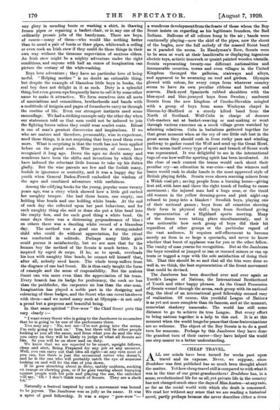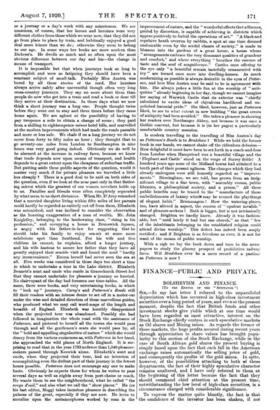CHE A P TRAVEL.
ALL our minds have been turned for weeks past upon travel and its expense. Never, we suppose, since Bradshaw was first published has so much been thought about the matter. Yet how cheap travel still is compared to with what it was in the time of our great-grandmothers! Bradshaw has, in a sense, revolutionized life for us all, yet private life in the country has not changed much since the days of Miss Austen—at any rate, so far as the social world with which she dealt is concerned. We read her without any sense that we are reading a historical novel, partly perhaps because she never describes either a dress
or a journey or a. day's work with any minuteness. We are conscious, of course, that her heroes and heroines wore very different clothes from those which we wear now, that they did not go from place to place by train, and habitually enjoyed a good deal more leisure than we do ; otherwise they seem to belong to our age. In some ways her books are more modern than Dickens's. He dwells so much and so often upon the most obvious difference between our day and his—the change in means of transport.
It is impossible but that when journeys took so long to accomplish and were so fatiguing they should have been a oonstant subject of small-talk. Probably Miss Austen was bored by all these stories of the med. Her heroines always arrive safely after uneventful though often very long cross-country journeys. They say no more about them than people do now who get into a train and read a book or doze till they arrive at their destination. In those days what we now think a short journey was a long one. People thought twice before they went out to stay and three times before they came home again. We are aghast at the possibility of having to pay twopence a mile to obtain a change of scene ; they paid from a shilling to eighteenpence minus hotel bills, and marvelled at the modern improvements which had made the roads passable and more or less safe. We chafe if on a long journey we do not cover from forty to fifty miles an hour ; they thought that to go seventy-one miles from London to Southampton in nine hours was very good going indeed. Obviously we do well to be alarmed at the increase in railway fares, because we know that trade depends now upon means of transport, and health depends to a great extent upon the cheapness of suburban traffic. But putting aside these public aspects of the question, would it matter very much if for private pleasure we travelled a little less cheaply ? There is a good deal to be said on both sides of the question, even if we look at the near past only in that flatter- ing mirror which the greatest of our women novelists holds up to us. Families and friends were often completely separated by what seem to us short distances. When Mr. D'Arcy remarked that a married daughter living within fifty miles of her parents could hardly be regarded as entirely cut off from them, Elizabeth was astonished, and was inclined to consider the observation as the boasting exaggeration of a man of wealth. Mr. John Knightley, belonging to the landowning class, "rising in his profession," and occupying a house in Brunswick Square, is angry with his father-in-law for suggesting that he should take his family to enjoy sea-air at some more salubrious spot than Southend. For his wife and five children he cannot, he explains, afford a longer journey, and his wife hastens to assure her father that they have all greatly enjoyed their seaside visit and found the mud "hardly any inconvenience." Emma herself had never seen the sea at all. Five weeks was considered in those days too short a time in which to undertake a tour in the Lake district. Elizabeth Bennett's aunt and uncle who reside in Graeechurch Street feel that they cannot undertake for pleasure a 'journey so hurried. No clairvoyant of the day had foreseen our time-tables. All the same, there were books, and very entertaining books, in which to "look up" journeys. Carey's and Patterson's Roads still fill their readers with an intense desire to set off in a motor-car under the wise and detailed direction of these marvellous guides, who produced what we may call word-maps of the length and breadth of England. Elizabeth was horribly disappointed when the projected tour was abandoned. Possibly she had followed in imagination the whole road with the assistance of Patterson, and pictured to herself all the towns she would pass through and all the gentlemen's seats she would pass by, all the "bold and appalling singularities of nature " which she would descry from the various eminences as, with Patterson in her hand, she approached the wild places of North England. It is sur- prising to read that in the year 1793 no fewer than 1,540 pleasure- seekers passed through Keswick alone. Elizabeth's aunt and uncle, when they projected their tour, had no intention of accomplishing even the dullest part of their journey in the fewest hours possible. Patterson does not encourage any one to make haste. Obviously he expects those for whom he writes to pass several days as well as nights away from post-chaise or coach. He wants them to see the neighbourhood, what he called "the coups d'oeil," and also what we call the "show places." He (or his last editor, Mogg) takes immense pleasure in describing the palaces of the great, especially if they are new. He loves to moralize upon the metamorphoses worked by man in the improvement of nature, and the " wonderful effects that affluence, guided by discretion, is capable of achieving in districts which appear positively to forbid the operations of art." "A blaok and repulsive heath overrun by rabbits, a spot at one time deemed undesirable even by the sordid classes of society," is made to blossom into the gardens of a great house, a house whose "arrangements embrace the very dissonant qualities of grandeur and comfort," and where everything "breathes the essence of taste and the soul of magnificence." Castles once offering to the eye only "a beautiful remain tastefully ornamented with ivy" are turned once more into dwelling-houses. As much modernizing as possible is always desirable in the eyes of Patter- son, and here Miss Austen may be said to be in agreement with him. She always pokes a little fun at the worship of "anti- quities " already beginning in her day, though we cannot imagine her saying of Warwick Castle that its exterior was "chiefly calculated to excite ideas of chivalrous hardihood and un- polished baronial pride." She liked, however, just as Patterson liked, to see to what extent in new building "the great errors of antiquity had been avoided." She takes a pleasure in showing her readers over Northanger Abbey, not because it was once a Gothic convent, but because it is (in her pages) a particularly comfortable country mansion.
Is modern travelling to the travelling of Miss Austen's day as Patterson's Roads is to Bradshaw? While we hold the former book in our hands, we cannot shake off the ridiculous delusion— How delightful it must have been to set forth in a coach-and-four from London when Hampstead was a beautiful village and the Elephant and Castle' stood on the verge of Surrey fields ! A hundred years ago none of the Midland towns had attained to a tenth part of their present ugliness. The changes which they had already undergone were still honestly regarded as "improve- ments." Birmingham, we are told, has grown from an insig- nificant village to a fine town, with "assembly rooms, public libraries, a philosophical society, and a prison." All these public benefits may be traced to the "manufacture of those embellishments of luxury whicit may be termed the playthings of elegant habit." Brummagem ! How the watering-places, too, have altered in aspect, the resorts of "opulent invalids" and of pleasure-seekers ! Bath is bigger, but is not intrinsically changed. Brighton we hardly know. Already it was fashion- able, but "until lately it had but one church," so that "few of the inhabitants belonging to the established religion could attend divine worship." This defect has indeed been amply rectified ; and if Brighton is as frivolous as ever, it is not for want of the means of public worship.
With a sigh we lay the book down and turn to the news- papers to study the gloomy prospect of prohibitive railway fares. Will Bradshaw ever be a mere record of a pastime as Patterson is now ?



































 Previous page
Previous page